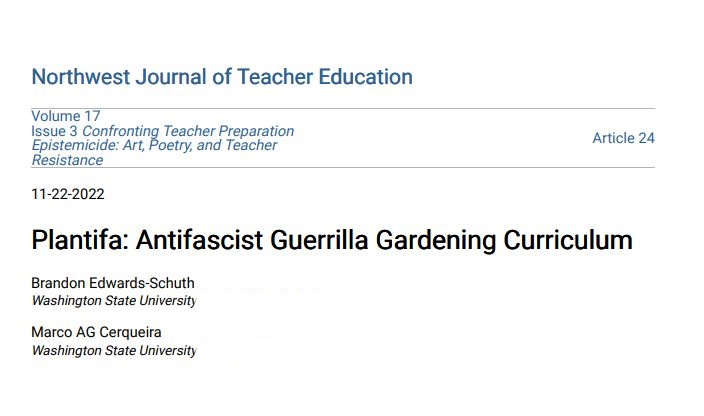
‘Guerrilla gardening’ entails intentionally ‘gardening without borders’ on other people’s land
“The world is facing a looming existential threat caused by exploitative habits and intentional
human negligence.”
That is how Brandon Edwards-Schuth and Marco Cerqueira, a pair of graduate students at Washington State University, describe the pending global crisis as they see it in their recent Northwest Journal of Teacher Education article.
Their solution to combat this dystopian future? “Plantifa.”
Plantifa is situated “at the intersections of anti-fascism, eco-justice, decolonization, and arts-based curriculum theories,” the scholars write.
“We feel that education rooted in a Plantifa curriculum can be one potential way for both teachers and communities to use a diversity of tactics to fight climate change and subvert power structures working against environmental justice,” the scholars state in their November 2022 paper.
If adopted, the authors note, they envision Plantifa being carried out by communities, as well as incorporated into current classroom lesson plans, perhaps as a final class assignment.
For that assignment, the scholars suggest students engage in the practice of guerrilla gardening, “a subversive and communal eco-justice approach to environmental degradation and inequity.”
Unlike traditional gardening, which the duo describe as taking place in “designated flower beds or defined community gardens,” guerrilla gardening, they write, entails intentionally “gardening without borders,” for example on somebody else’s land.
Anti-fascist guerrilla gardeners, they write, assist “nature in breaking trespassing laws, where it is really the insatiable consumption inherent under capitalism which has trespassed Earth.”
“[V]acant lots, medians, and ‘derelict land’” are just some of the sites anti-fascist guerrilla gardeners may target, note the pair of scholars, as these are all “spaces of eco-potentiality.”

In laying out what Plantifa assignments might look like in the real world and hence beyond the pages of the Northwest Journal of Teacher Education, the scholars write of how students would start assignments with an initial reconnaissance mission to scout out possible locations for their guerrilla assault on the colonialist regime. Next, they would choose their flora. Then finally, the planting would begin.
Planting “may be discreet,” they state, perhaps using drones to drop “seed bombs” on otherwise inaccessible “remote or barricaded spaces.”
“At other times,” they suggest, “it may be easier to just place whole plants into an area chosen in communality with the students.”
Upon completion of their Plantifa assignments, students would then reflect on their Plantifa experience, the scholars state. The following are some of the suggested questions for students to ponder:
“Why is ‘democracy’ as we understand and practice limited to humans, and who, what, or where ought to be included in a democracy?”
“Why are spaces ‘owned,’ ‘private,’ or possess value (or none)?”
“What is your local flora, and is it legally and/or ethically wrong to plant without boundaries…”
“Why is anti-fascism important to our community, our eco-system?”
Curious about some of the practical aspects of Plantifa’s proposed implementation, The College Fix reached out recently to both Edwards-Schuth and Cerqueira via email with a series of questions.
These largely concerned the grade level for which the scholars believed Plantifa to be most appropriate and whether they worried instructors or educational institutions might be reluctant to adopt the Plantifa curriculum over concerns that certain aspects of it are technically illegal, opening the door to students potentially being arrested and participating institutions facing legal repercussions for encouraging students to garden without borders.
Although neither Edwards-Schuth nor Cerqueira replied to The College Fix’s inquiries by the time of publication, they do acknowledge in their paper that what they present is just “a start of what Plantifa…might look like.”
Hence, there are still details to be worked out. To some extent they even acknowledge possible legal challenges to their work in their proposed next steps along with partnering with local food banks and working with indigenous communities to decolonize work.
In the meantime though, the architects of Plantifa do not seem as if they will permit such trifles as the legality or practicality of their proposed pedagogy to hold them back.
“We feel that Plantifa is one of many curriculum possibilities towards social and environmental justice in our local communities and globally,” they write.
“We are nature,” they declare to the world. “We are the yarning tracing ways of common guerrilla gardeners. We are the planet. We are plants. As we plant seeds, we become the seeds. We all are Plantifa!”
MORE: Scholars work at ‘Decolonizing Light’ to combat ‘colonialism in contemporary physics’





Please join the conversation about our stories on Facebook, Twitter, Instagram, Reddit, MeWe, Rumble, Gab, Minds and Gettr.